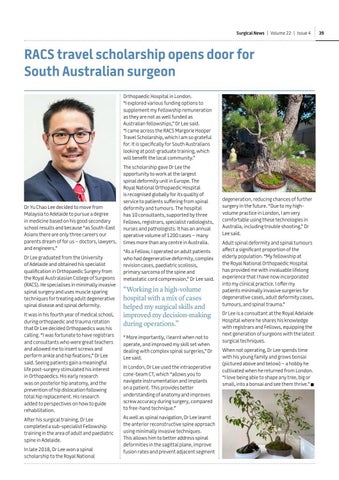Surgical News | Volume 22 | Issue 4
RACS travel scholarship opens door for South Australian surgeon Orthopaedic Hospital in London. “I explored various funding options to supplement my Fellowship remuneration as they are not as well funded as Australian fellowships,” Dr Lee said. “I came across the RACS Margorie Hooper Travel Scholarship, which I am so grateful for. It is specifically for South Australians looking at post-graduate training, which will benefit the local community.”
Dr Yu Chao Lee decided to move from Malaysia to Adelaide to pursue a degree in medicine based on his good secondary school results and because “as South-East Asians there are only three careers our parents dream of for us – doctors, lawyers, and engineers.” Dr Lee graduated from the University of Adelaide and obtained his specialist qualification in Orthopaedic Surgery from the Royal Australasian College of Surgeons (RACS). He specialises in minimally invasive spinal surgery and uses muscle sparing techniques for treating adult degenerative spinal disease and spinal deformity. It was in his fourth year of medical school, during orthopaedic and trauma rotation that Dr Lee decided Orthopaedics was his calling. “I was fortunate to have registrars and consultants who were great teachers and allowed me to insert screws and perform ankle and hip fixations,” Dr Lee said. Seeing patients gain a meaningful life post-surgery stimulated his interest in Orthopaedics. His early research was on posterior hip anatomy, and the prevention of hip dislocation following total hip replacement. His research added to perspectives on how to guide rehabilitation. After his surgical training, Dr Lee completed a sub-specialist Fellowship training in the area of adult and paediatric spine in Adelaide. In late 2018, Dr Lee won a spinal scholarship to the Royal National
The scholarship gave Dr Lee the opportunity to work at the largest spinal deformity unit in Europe. The Royal National Orthopaedic Hospital is recognised globally for its quality of service to patients suffering from spinal deformity and tumours. The hospital has 10 consultants, supported by three Fellows, registrars, specialist radiologists, nurses and pathologists. It has an annual operative volume of 1200 cases – many times more than any centre in Australia. “As a Fellow, I operated on adult patients who had degenerative deformity, complex revision cases, paediatric scoliosis, primary sarcoma of the spine and metastatic cord compression,” Dr Lee said.
“Working in a high-volume hospital with a mix of cases helped my surgical skills and improved my decision-making during operations.” “ More importantly, I learnt when not to operate, and improved my skill set when dealing with complex spinal surgeries,” Dr Lee said. In London, Dr Lee used the intraoperative cone-beam CT, which “allows you to navigate instrumentation and implants on a patient. This provides better understanding of anatomy and improves screw accuracy during surgery, compared to free-hand technique.” As well as spinal navigation, Dr Lee learnt the anterior reconstructive spine approach using minimally invasive techniques. This allows him to better address spinal deformities in the sagittal plane, improve fusion rates and prevent adjacent segment
degeneration, reducing chances of further surgery in the future. “Due to my highvolume practice in London, I am very comfortable using these technologies in Australia, including trouble shooting,” Dr Lee said. Adult spinal deformity and spinal tumours affect a significant proportion of the elderly population. “My fellowship at the Royal National Orthopaedic Hospital has provided me with invaluable lifelong experience that I have now incorporated into my clinical practice. I offer my patients minimally invasive surgeries for degenerative cases, adult deformity cases, tumours, and spinal trauma.” Dr Lee is a consultant at the Royal Adelaide Hospital where he shares his knowledge with registrars and Fellows, equipping the next generation of surgeons with the latest surgical techniques. When not operating, Dr Lee spends time with his young family and grows bonsai (pictured above and below) – a hobby he cultivated when he returned from London. “I love being able to shape any tree, big or small, into a bonsai and see them thrive.”
39



































